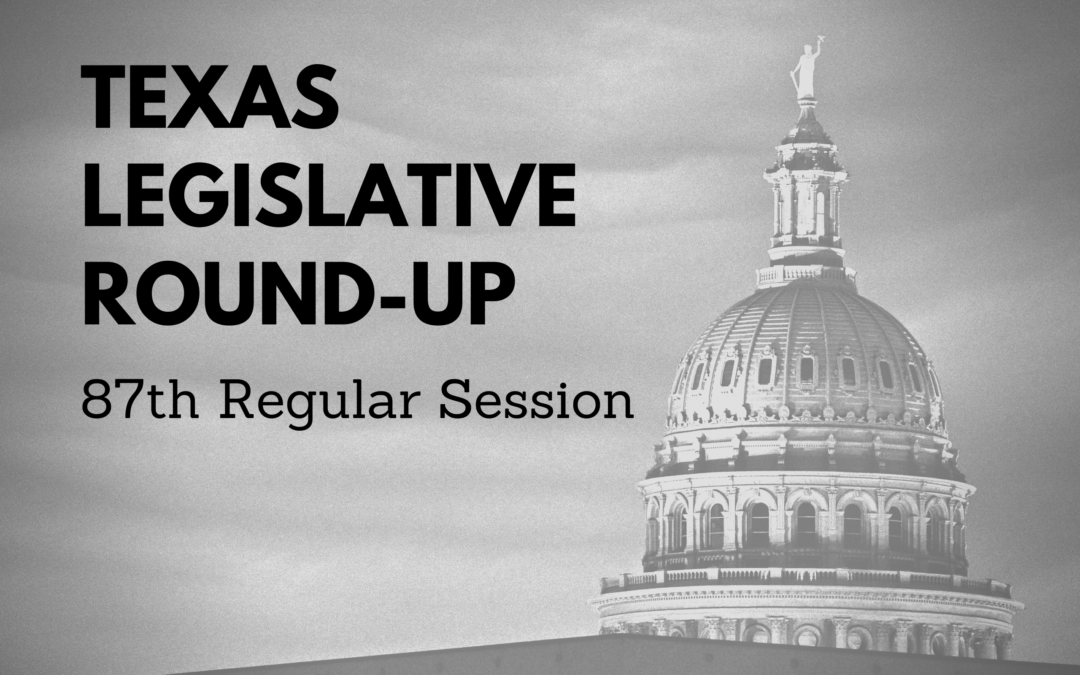Question of Correcting Wholesale Electricity Prices Divides Texas House and Senate.
________________________________________________

The February 15–19 ice storm that left more than 4 million Texans without power continues to roil the political waters in Austin. Recent developments include the resignation of the last remaining Public Utility Commissioner, the emergence of a serious political schism over disputed energy charges, and a flood of gas and electricity-related legislative bill filings.
Here’s a quick recap of recent legislative and political developments relating to Winter Storm Uri.
THE REPRICING ISSUE
Carrie Bivens, the Independent Market Monitor for the ERCOT market, issued a letter on March 4 in which she identified $16 billion in added costs she said resulted from “inappropriate price intervention.” According to Ms. Bivens’ letter, ERCOT inappropriately pegged prices at a $9,000 regulatory cap for about 32 hours during the storm. She called the price intervention an “error,” and said that as a result, ERCOT should claw back about $4.2 billion in charges.
Ms. Bivens’ letter led to a political chain-reaction, culminating in a press conference on Thursday, March 19, by Lt. Gov. Dan Patrick in which he urged Gov. Greg Abbott to address the repricing issue immediately. It remains unclear, however, whether the repricing will occur.
Briefly, here is the chain of events surrounding the repricing issue, organized chronologically.
Tuesday, March 9 — A letter dated March 9 and signed by most members of the Texas Senate is delivered to PUC chair Arthur D’Andrea. It urges him to correct ERCOT prices during a 32-hour period that ended at at 9:00 a.m. on February 19.
Thursday, March 11 — PUC Chair D’Andrea tells members of the House State Affairs committee that he will not order the repricing because he does not agree with Ms. Bivens’ assessment, and because ERCOT rules allow only for repricing due to an operator mistake. This followed similar comments D’Andrea made earlier as well as comments made by outgoing ERCOT CEO Bill Magness. Mr. D’Andrea said repricing wholesale and ancillary energy prices would harm various entities that had done a good job hedging for the winter weather and with winterizing. “There’s sort of a devil you know of re-pricing,” he said.
During an extremely tense Senate Jurisprudence meeting also on March 11, Lt. Gov. Dan Patrick accused Mr. D’Andrea of being untruthful in some of his statements. Lt. Gov. Patrick likewise insisted that Mr. D’Andrea was well within his authority to order the repricing. It was extremely unusual for the lieutenant governor to participate in such a direct manner in a committee meeting.
Monday, March 15 — At Lt. Gov. Patrick’s urging, the Senate Jurisprudence Committee held a rushed meeting in which Sen. Bryan Hughes laid out Senate Bill 2142 that would mandate the repricing. SB 2142 was voted favorably from committee and then the full Senate adopted it soon afterward by a 27-3 vote. Notably, Sen. Kelly Hancock, chair of Senate Business and Commerce that typically has responsibility for electric energy issues, was among the dissenters. The speed with which the Senate introduced and adopted SB 2142 is like nothing seen in recent years.
Tuesday, March 16 — House Speaker Dade Phelan makes a statement via Twitter that there was “no error” in ERCOT’s pricing decision and said that to order a repricing would represent “an extraordinary government intervention into the free market.” The House State Affairs also considered the repricing issue during a meeting on March 16 — although without having SB 2142 officially before it, the committee took no action.

PUC Chair Arthur D’Andrea announces resignation.
Also on March 16, PUC commissioner D’Andrea resigned, subject to appointment by his successor by Gov. Greg Abbott. The announced resignation came after Texas Monthly magazine reported on leaked audio tapes in which Mr. D’Andrea told investors he would put the “weight of the commission” behind keeping the charges in place. Gov. Abbott apparently insisted on Mr. D’Andrea’s resignation.
March 18 — Lt. Gov. Patrick holds a press conference urging Mr. D’Andrea to order the repricing before he departs from the commission. In the alternative, Gov. Abbott should announce the pricing was under investigation in order to extend the deadline for making the change, Patrick said.
Separately on March 18, the House State Affairs Committee adopted several priority bills relating to the weather event, as described below.
FILED BILLS
The deadline for filing bills during the 87th Legislative Session passed on March 12. House lawmakers have filed more than 4,500 bills before that deadline, while Senate lawmakers filed more than 2,100 bills. Among those bills are about 400 relating to electric and gas energy issues — or three to four times the usual number of such bills filed during a more typical session. Much or most of the increase in the filed bills is attributable to increased interest in energy issues because of the ice storm.
Below we summarize some bills that merit watching. Please note, however, that inclusion on this list does not imply our support or opposition. We summarize these bills for informational purposes only.
Securitization Bills
A number of bills would facilitate the “securitization” of extraordinary costs relating to the storm. Securitization is a financial technique to use debt to pay costs over an extended period of time. Securitization bills include SB 1579, by state Sen. Kelly Hancock, and its companion, HB 1520 by Rep. Chris Paddie. Both Hancock and Paddie are chairs of the Senate Business and Commerce Committee and the House State Affairs Committee, respectively. These bills authorize the issuance of “Customer rate relief bonds” to recover extraordinary costs. Notably, however, these bills go beyond the recent ice storm and addresses hurricanes, floods, or even manmade disasters. HB 1520 will be heard in House Energy Resources on Monday, March 22. No hearing has been set so far for SB 1579.
Another securitization bill is HB 4492, also by Rep. Paddie. HB 4492 establishes a non-by-passable charge to pay down the securitization bonds and a true-up process..
Battery Storage
Some bills would facilitate battery storage by transmission and distribution utilities for reliability purposes. One such bill, Senate Bill 415 by Sen. Kelly Hancock, was considered March 16 in the Senate Business and Commerce committee. Another, HB 1672 by Justin Holland, was considered March 18 in the House State Affairs Committee.
ERCOT and PUC Governance Bills
A number of bills relate to the governance of the Public Utility Commission, with some bills changing the number of its members. For instance, House Bill 3093, by state Rep. John Smitthee, would replace the PUC with a “Department of Public Utility” with one commissioner instead of three. Other bills would increase the number of PUC commissioners to five (HB 3473 by Rep. Gina Hinojosa) or seven (HB 3487 by Rep. Shawn Theirry).
A number of bills that would change the governance of ERCOT, including some that would require that board members and its executive director to reside within Texas. Others that would grant the governor greater authority in the appointment of ERCOT board members. These include HB 10, by Rep. Chris Paddie, that would change the method for selecting ERCOT’s five unaffiliated members and stipulates that all board members must reside in Texas. The House State Affairs committee approved a substitute for House Bill 10 by a 12-0 vote on Thursday, March 19.
Retail Electric Bills
Some bills would bar offers by retail electric providers that peg the price of electricity to wholesale spot prices. This relates to reports that some consumers faced bills for thousands of dollars because they were purchasing retail electricity through wholesale indexed deals. One such piece of legislation that bans wholesale indexed products is HB 16, by Ana Hernandez. The House State Affairs committee approved a substitute for House Bill 16 by a 11-1 vote on Thursday, March 19.
Priority Bills Adopted in Committee
The House State Affairs Committee also adopted a number of other significant bills on Thursday, March 19. These include HB 10 and HB 16, mentioned above, as well as the following:
- House Bill 11, by Paddie, “relating to the extreme weather emergency preparedness of facilities for providing electric service.” This bill would mandate weatherization by generation facilities. A committee substitute was adopted 12-0.
- House Bill 13, also by Paddie, “relating to the establishment of the Texas Energy Disaster Reliability Council.” The legislation creates a new council consisting of the chair of the PUC, the chair of the Railroad Commission, the executive director of both agencies, the chief executive officer of ERCOT and the chief of the Texas Division of Emergency Management. The council will be charged with taking actions to prevent an extended power outage caused by a disaster. A committee substitute was adopted 12-0.
- House Bill 17, by Rep. Joe Deshotel, “relating to the restriction on the regulation of utility services and infrastructure based on the energy source to be used or delivered.” This bill stipulates that no political subdivision may adopt any measure to directly or indirectly limit or prohibit utility service based on the type or source of energy to be delivered to the end-use customer. Representatives of the gas utility industry are pushing this bill in response to efforts by some cities elsewhere in the United States to adopt rules to encourage the construction of all-electric homes. A number of environmental group representatives have expressed their opposition to HB 17. A committee substitute was passed out on a 12-0 vote.

